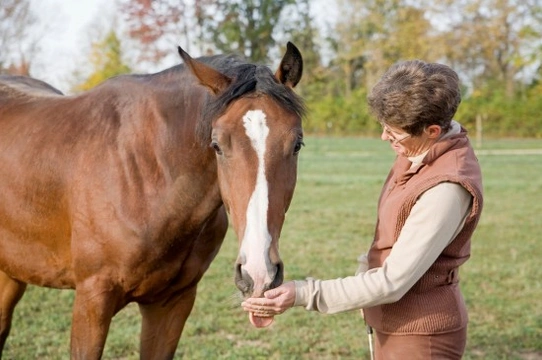
Alternative Sources of Fibre for Horses
All horses and ponies no matter what breed need to have fibre in their diets and research has shown that when horses are not fed enough they often suffer from digestive problems which includes colic. However, studies have also show that feeding a horse insufficient amounts of hay can also lead to them developing a few behavioural issues too and this includes crib biting which is a very frustrating vice.
The main sources of fibre in a horse's diet are hay and grass, but there are alternatives you can safely feed to horses if you find you've run short of hay and these includes the following:
- Haycubes
- Complete feeds
- Fibre by-products
Haycubes
Haycubes are a brilliant source of fibre and the good news is you can buy them at most good feed merchants and stores. The benefits of feeding haycubes as a source of fibre are as follows:
- Haycubes generally contain far less dust than baled hay. This is a huge benefit for all horses but more especially for those that are prone to suffering from any sort of respiratory disorder
- You'll find there is a lot less wastage when feeding haycubes as opposed to feeding baled hay which can make it more cost effective
However, if left to their own devices horses tend to eat far more haycube than they would other hay which means you need to keep an eye on their daily intake. It can be fed much in the same way as hay at the same ratio. If your horse gets through 5lbs of Timothy hay this can be replaced with 5lbs of haycubes, but you may have to tweak the amount in order for your horse to maintain a good body weight.
The thing to bear in mind is that haycubes are quite a bit heavier than baled hay which means you have to make sure your horse is being fed the correct amount of forage on a daily basis.
Complete Feeds
Modern complete horse feeds are specifically formulated so they provide much of a horse's nutritional needs which includes the amount of fibre required. Again, good feed merchants now stock a great choice of equine complete feeds with the majority of them containing well over 16% crude fibre.
Complete feeds are formulated to be fed in larger amounts as compared to hard feeds that boast a lower fibre/grain mix. In short, it can be fed to horses without the need for them to be fed any hay. As such, you would need to feed your horse small meals throughout the day. With this said, reading and following feeding instructions is essential so that you get the amounts absolutely right.
By-product Fibre Sources
There is a choice of by-product fibre sources available which means if you find you are short of hay for any reason at all, you can always fall back on these in an emergency. These include the following:
- Sugar Beet Pulp
- Bran
- Grain hulls
Sugar Beet Pulp
Sugar beet pulp is a great fibre source for two reasons. Firstly, it's extremely palatable and secondly, it's highly digestible. Research into equine nutrition has shown that a horse's diet can be quite safely made up of anything up to 55% sugar beet pulp.
The thing to bear in mind, is that it's digestibility is a lot higher than that of the majority of hays including grass hay. For this reason, it's important to make sure your horse's diet is well balanced if and when you want to include sugar beet pulp in their diet rather than hay.
Brans
Rice bran and wheat bran are two more alternative fibre sources for horses, although not quite as desirable due to the high phosphorus content. However, if you have run out of hay, they are both useful to have in a feed room for emergencies. It's important that horses when fed bran are given adequate amounts of calcium with the ratio being a minimum of 1:1.
Another thing about rice bran is that it boasts a high fat content, which means it's not a good idea to feed it to horses that are overweight or obese.
Conclusion
It can be extremely frustrating when you run out of hay or find that your stock of hay bales has turned mouldy and therefore unusable. If you have to wait for a hay delivery, don't despair because the alternative fibre sources listed above will ensure your horse gets the correct amount in their diet until the delivery arrives. By far the best choice is haycubes which tend to work out a little cheaper than complete feeds. They are better to feed to horses rather than by-products such as bran because of the phosphorus problem. If you have any concerns about your horse's fibre intake you should discuss things with your vet.



